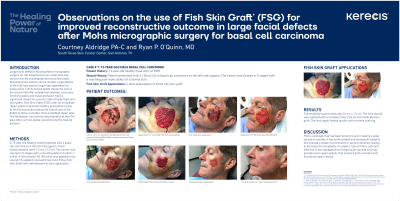Case Series/Study
(CS-002) Observations on the use of Fish Skin Graft (FSG) for improved reconstructive outcome in large facial defects after Mohs micrographic surgery for basal cell carcinoma

Large facial defects following Mohs micrographic surgery for the treatment of non-melanoma skin cancers can be challenging reconstructive cases. Reconstructive options can be limited. Large defects of the mid-face require large flaps dependent on tissue laxity. Full thickness grafts freeze the size of the wound and offer suboptimal cosmetic outcomes. Smoking status and tissue profusion have a significant impact on success rates of large flaps and skin grafts. Fish Skin Grafts (FSG) offer an immediate repair option to promote healthy granulation tissue to fill the wound and reduce the overall size of the defect to allow a smaller, more simplified repair later. The hemostatic and antimicrobial benefits of the FSG also offers a more stable wound during the healing process.
Methods:
A 73-year-old healthy male presented with a basal cell carcinoma on the left mid-zygoma. Initial measurements were 1.5 cm x 1.0 cm. The cancer was cleared in 5 stages with a resulting defect of 6.5cm x 6.5cm. A micronized FSG (38 units) was applied to the wound. The patient received three more FSGs (Fish Skin Graft) with debridement at each application.
Results:
The resulting wound measured 2.0 cm x 1.5 cm. The final wound was repaired with a complex linear closure and small Burow's graft. The final repair healed quickly with minimal scarring.
Discussion:
FSG is a biologic that has been proven to aid in healing a wide variety of wounds. It has antimicrobial and hemostatic benefits that provide a stable environment for second intention healing to decrease the complexity of a defect. Use of FSG is safe and effective in the management of large facial wounds and may provide more repair options that enhance both cosmetic and functional repair results.
Trademarked Items:
References:

.png)